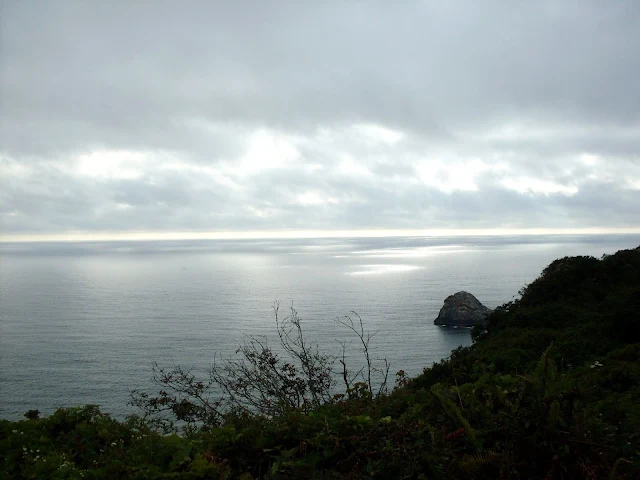In his last book and final apocalyptic vision in which he forecasts the end of the human species, H.G. Wells includes a one-page chapter titled "Race Suicide By Gigantism," in which he asserts that a species that predominates for awhile often ends by growing larger and larger before going extinct. "In the record of the rocks it is always the gigantic individual who appear at the end of each chapter."
Wells does not elaborate on why this applies to human beings (a problem as well with the rest of this short book, Mind At the End of Its Tether.) It would be curious if he meant it applied to human bodies physically--not when Wells wrote this book at the end of World War II, especially not in England and Europe, where food shortages and warfare had the opposite effect.
But it occurred to me reading this recently that it may well apply to human bodies now. In 2002 a CDC study found that the average American adult was slightly taller than in 1960, but a lot heavier--by 25 pounds. The trend towards heavier continued in a 2015-16 study. Weight increased particularly among whites and Hispanics; for all populations and both genders, the average weight gain was around 30 pounds from 1960.
And it's not just Americans. Another study found that globally, the average adult was 1.3% taller and 14% heavier in 2014 than in 1974. Perhaps this is why the portrayal of future humans in the popular 2008 animated feature WALL-E caused such a shock of recognition as well as controversy.
This increased weight comes at a cost, not only in individual health but in resources used and needed. That 2014 study also found that energy consumption increased by over 6% as a result. But there is also the need for more food and the result of more refuse. WALL-E posited a future in which garbage has taken over the planet, which doesn't even have plant life left. Meanwhile a spaceship full of fat humans are splayed inert in mobile chairs, slurping Big Gulps and downing Big Macs, circulating through a huge shopping mall amusement park, manipulated by an A.I. mall manager.
That future factors in another postwar trend: the human population explosion, from 2.3 billion people in 1940 to 7.7 billion now. The US population has itself more than doubled from when Wells was writing and I was born, from 141 million to 327 million now. That's 186 million more people (which is more than the total population in 1960) in the same space (though the addition to the Union of Hawaii and still lightly populated Alaska makes some difference.)
These are not just numbers. Numbers can be deceptive--they may not show why they seem to show. But the change is there to see, if you've lived long enough to see it. To me the difference is striking, even from the 1970s and 80s when I spent a lot of time trolling through shopping malls. People are just way bigger, and there are a lot more of them.
This all contributes to the other kinds of gigantism that Wells saw building in his own time. The immense resources needed to make the planes and tanks, ships and bombs that were used in World War II suggested the scale of human exploitation of the planet. The scale of that continuing and growing exploitation, and the future resources destroyed in the process, is the first cause of the mortal threat to humanity and life as we know it on Earth.
It is appropriate to consider this on this Fourth of July weekend, which like Christmas and most other official holidays, is more an increasingly manic and desperate celebration of ever-swollen excess than anything else. Particularly this year in Washington.
Once you start looking for it, gigantism is everywhere. Americans are not only bigger, but these days they are back to demanding bigger vehicles--no longer the cabin cruisers on wheels of the late 50s and early 60s, but ever new and larger trucks and vans and their various crossbreeds. Considering what it takes to keep up with this physical inflation, it's no wonder there is rapidly decreasing room for anything else.
Cities are becoming larger, even in proportion to population growth. New forms of mining for oil and gas as well as minerals destroy and pollute vast areas of land and water. Those Big Macs require the destruction of huge tracts of rainforest for cattle. The unimaginably large oceans are incredibly overwhelmed by garbage and pollution.
Outsized political rhetoric not only overwhelms realistic subtleties, but by its very gigantism it becomes necessarily--and often transparently--phony and false. What used to be called The Big Lie is small potatoes in the newsfeed, allowing such outrages as American concentration camps on the southern border.
Even our entertainment gets bigger and more costly all the time. I used to enjoy popular movies such as superhero films, but now that their budgets literally would pay for actual spacecraft, as well as addressing crises identified in increasingly wasteful mailings from worthy organizations, I can't watch them.
Increased human weight is not all due to Big Macs and Big Gulps. A 2015 study found that people of the same age who ate the same number of calories and exercised as much as did people in the 1980s are heavier anyway. Factors that may account for the difference include chemicals and other pollutants, certain prescription drugs and reduction in microbiomes, the population of genes from microbes contained in the human body. All of these, in turn, can be see as results of societal gigantism.
The dinosaurs failed when confronted with the results of a gigantic catastrophe--the impact of a huge asteroid. Smaller creatures survived. But physical size may not be the only or most important factor for humans. The size, power and interdependent complexity of global society makes it stronger in some ways, but a lot more vulnerable in others. A huge earthquake in the wrong place could fracture the global economy enough to affect billions. And with nuclear weapons around, there's no telling where spiraling consequences end up. This applies as well to the slower motion challenges of the climate crisis. This summer has already seen killer heatwaves in India, record high temperatures across Europe, and in Alaska and the Arctic.
"The planet spins, climate changes, so that the old overgrown Lord of Creation is no longer in harmony with his surroundings," Wells wrote in 1946. And there were still 31 years to go before the invention of the Big Mac.
Starting With Stoppard
-
Tom Stoppard died in November 2025. From his first success in the late
1960s--*Rosencrantz and Gildenstern Are Dead-*- to now, I followed his
career and...
3 weeks ago






























